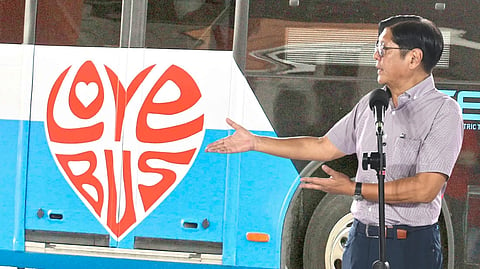
- NEWS
- the EDIT
- COMMENTARY
- BUSINESS
- LIFE
- SHOW
- ACTION
- GLOBAL GOALS
- SNAPS
- DYARYO TIRADA
- MORE

The iconic “Love Bus,” a pop-culture staple of Manila’s streets in the late ’70s and ’80s, is back — this time in sleek, electric blue. The unique logo of the same words bordered by a heart, however, still mirrors that of the past.
On Saturday, President Ferdinand R. Marcos Jr., First Lady Louise Araneta-Marcos, and their son Simon led the ceremonial send-off of the Love Bus during the “Handog ng Pangulo” service caravan at the Valenzuela Gateway Complex (VGC).
The launch also coincided with the President’s 68th birthday, which he marked by unveiling the Love Bus “Libreng Sakay” program offering free rides to commuters.
The revival of the Love Bus, now reimagined as a clean and accessible ride for modern commuters, is part of the Department of Social Welfare and Development’s Sustainable Livelihood Program (DSWD-SLP) Persons with Disabilities–Electric Transportation Service (PWD-ETS).
The project is in partnership with Global Electric Transport (GET) Philippines, the company behind the fleet of new, emission-free vehicles.
A total of 20 fully electric Love Buses have been deployed, each with a seating capacity of 20, standing room for 10, and space for four wheelchairs. The buses are fitted with accessibility ramps and features designed for persons with disabilities.
Free rides are available to senior citizens and PWDs at all times, while other commuters can ride for free during peak hours from 6 a.m. to 9 a.m. and 5 p.m. to 8 p.m. As a launch treat, all commuters will enjoy free rides for the entire month of September.
It was a festive affair: Cabinet officials came in full support, including DSWD Secretary Rex Gatchalian, DPWH Secretary Vince Dizon, and DoTr Acting Secretary Giovanni Lopez.
The President, who arrived at the venue aboard one of the new buses, said, “This is more than just a nostalgic return of a Metro Manila icon. It’s a step forward toward a safer, greener, and more inclusive public transport system.”
The Love Bus, first introduced in the 1970s by former First Lady Imelda Marcos as the country’s first air-conditioned bus service, quickly became an icon of urban progress.
Following pilot runs in Cebu and Davao earlier this year, its return to Metro Manila signals not only a nod to history but also the administration’s vision for cleaner, more equitable mass transport.
